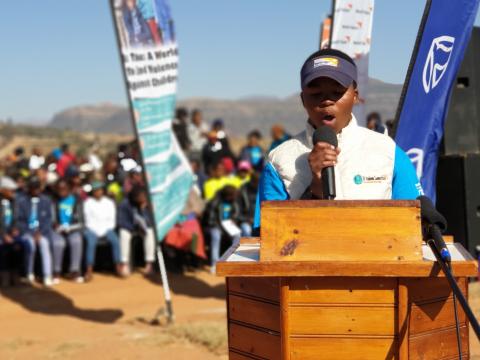Signalling the child protection risks linked to initiation schools in Lesotho

World Vision, in partnership with the Ministry of Tourism, Environment & Culture, together with other stakeholders are working tirelessly to ensure there is a legislation regulating initiation schools, to keep them from exploiting children. This focus was prompted by several cases of children returning from initiation schools no longer wanting to return to regular schools, getting married early, and rendering the tradition of initiation disrepute. Several children have also been reported to have turned to numerous criminal activities.
Typical community life among children and influences
It is in the evening after school hours. Community boys aged 12 to 24 years old are gathered at a sports field where they usually meet to hang out, play soccer and sing songs. Girls from around the community join in to watch. There is a song and a dance.
As always, during the games, a group of boys who were initiated into manhood separate themselves from the rest; “Come, let’s step aside and discuss issues of men”, they say. It is this that often left Seephephe (not his real name) feeling the need to prove he is man enough amongst his peers since he had not been initiated yet.
The pressure to fit in amongst his peers caused Seephephe and his four friends to leave their homes and join the initiation school that was enrolling on the mountain overlaying their community. “We made the decision to go in 2017. Two of us were aged 17, one was 16 and the other 15 years old”, he recalls.
Life-changing decisions often take months to make, even years but not for these four. “It took a day to agree on the decision to join the initiation school. News about my enrolment at the initiation school reached back home. My uncle who himself was initiated came and fetched me before my friends and I joined the rest of the initiates”, Seephephe narrates.
Initiation into adulthood was never for children to begin with
Seephephe’s uncle did not feel his nephew was grown enough to be initiated. At age 17, Seephephe was still very young to be recognised as an adult by the courts of law when addressing issues of community interest. Initiating him would defeat the purpose for which boys and girls were initiated into adulthood.
“I understood my uncle, and have since decided not to persist going to initiation school, rather to pursue my studies and see what I make of my life. I completed my high school leaving class last year, in 2018. I am waiting for acceptance at a tertiary institution where I have applied to study civil engineering”, Seephephe concludes.
One of Seephephe's friends who was not sent back home, and was able to go through with the initiation programme, Thabo (not his real name) would not encourage anyone to be initiated into adulthood at a young age. “If it were possible to undo what was done, and I was given a chance to decide whether or not to return to initiation school, I would wait until I am mature enough. I promise you, initiation into adulthood is not meant for children. Understand, I am not saying the practice of initiating people is wrong, it is necessary. I just don’t think it’s for children”, said Thabo, being careful not share the nitty-gritties of what he was taught at the initiation school.

Thabo further outlines some of the underlying stressors as to why many children who were initiated are involved in many criminal activities that mostly affect them. “Upon returning from the initiation school where we were groomed into manhood, we feel the need to get married and have our own wives. We marry girls our age or younger. We are men, we don’t want to be ordered around like children.”
Initiation into adulthood in its early years
Initiation in its early stages, in the years 1800, was meant for instilling discipline, and a requirement for those who were physically ready to join the national armies for protecting the country. Lepoqo, the founder of the Basotho nation used those who had been initiated into manhood in his armies.
Letsielo Pooea, a member of the National Initiation Schools Steering Committee says that when the national security in the 1900s was entrusted to the military of the British model, initiation rites shifted to those with the physical capacity to shoulder the responsibilities of providing for families. These according to customary law are those who are certified as ready by their parents or legal guardians.
Over time, the initiation practice was exploited by those with the interest of gaining profits out of it when they realised so many young boys with the desire of graduating into men. “These profit-makers know that they can initiate children freely because there is no law which prohibits them”, Letsielo explained during a roundtable discussion for sensitising Members of Parliament on the need to regulating initiation schools last month, June 2019.
According to Letsielo, children are not emotionally ready to comprehend the weight of the syllabus taught at initiation schools, and keep it sacred. He mentioned a case of a boy who following his initiation, gathered his peers in a community valley demonstrating to them what is being done during initiation. He outlined these to Members of Parliament at a roundtable organised by World Vision and its partners, and funded by United Nations Fund for Population (UNFPA).